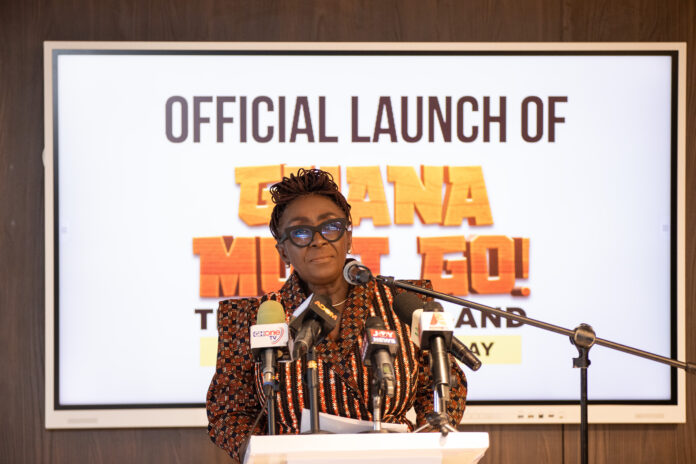…leveraging Big Push, Black Star Experience
By Ebenezer Chike Adjei NJOKU
The Minister for Tourism, Culture and Creative Arts, Dzifa Gomashie, has stated that theatre, a sector of the creative arts industry, will serve as a key driver of the government’s Big Push agenda, particularly through the Black Star Experience, the country’s flagship cultural-industrial programme aimed at attracting foreign investment and tourism.
According to her, the originality and emotive power of theatre arts make it a major component of the government’s cultural and economic strategy.
Speaking at the launch of ‘Ghana Must Go, a new theatrical production by renowned playwright Latif Abubakar, the Minister said: “Through immersive theatre, we are using one of Ghana’s richest assets—our culture—to drive one of Ghana’s biggest ambitions: positioning Ghana as a premier destination for tourism and investment in Africa.”
The government’s Black Star Experience, launched recently, consolidates tourism, heritage, and the creative economy into a unified strategy to project Ghana as a global cultural hub. It forms part of the broader Big Push Ghana initiative, which aims to transform the economy through investment in infrastructure, industry, and human capital.
Latif Abubakar, Chief Executive of Globe Productions noted that the creative industry has since moved on from a time when it was considered to be solely driven by passion. “It is about power, profits, and progress. If we truly believe in the power of our stories, we must do more than share them—we must build industries around them,” said.

Mr. Abubakar, marking 15 years in theatre, has written and staged 20 plays with over 79 performances across Ghana, and internationally in Spain. In 2020, during the pandemic, his company pioneered virtual public performances, which reached over 3.5 million viewers, with support from the ministries of Health and Information.
He also introduced Theatre on the Cruise, a production staged on the Volta Lake, further highlighting the export potential of Ghanaian theatre. The title, ‘Ghana Must Go’, a re-appropriation of a politically charged phrase from the 1980s, is intended to tell a new story about Ghana—one of resilience, identity, and global relevance.
Explaining, Mr. Abubakar said: “‘Ghana Must Go’ is a comical, culturally rich, and inspirational stage production that follows the journey of a tourist-turned-investor who discovers the vast opportunities, beauty, and potential of Ghana.
“It fuses music, dance, humour, and drama to tell Ghana’s story in a way that no PowerPoint ever could, touching hearts, shifting perceptions, and stirring action. This theatrical experience becomes the entry point for international audiences to explore Ghana’s economy, culture, investment landscape, and tourism destinations, all in one unforgettable evening,” he added.
The play, which is set to premier later this month, is expected to tour global cities including New York, Toronto, London, Lagos, Johannesburg, and Jeddah, with performances serving as platforms to mobilise up to 2,000 investors and stakeholders per location, Mr. Abubakar noted.
This comes as Foreign Direct Investment into the country has fluctuated over the past half-decade, in part due to broader macroeconomic developments. In 2021, FDI inflows into Ghana rose by 35 percent, to US$2.5 billion from the previous year. In 2023, however, inflows dropped to US$1.3 billion, a 7.6 percent decline from 2022.
The Ministry of Tourism estimates that tourist arrivals reached approximately 1.1 million in 2023, recovering from pandemic lows but still below the 1.3 million recorded in 2019. The goal is to reach 1.5 million annual visitors by 2026, with projected tourism receipts of US$3 billion.
Globally, the creative economy—comprising goods, services, and intellectual property—is valued at over US$2.25 trillion, according to UNESCO, with Africa contributing less than 3 percent. “This is our story, told through people, inspiration and truth. We are calling on corporate sponsors, development partners, and the media to support this not just as an event, but as an economic transformation agenda,” the sector minister, Dzifa Gomashie added. She also highlighted the need for training institutions to support the creative arts ecosystem.
“We need a school that trains the whole value chain—in tourism, culture, and the creative arts. We must go beyond the performance and build the infrastructure to support it,” she said.
President of the Ghana Journalists Association, Albert Kwabena Dwumfour, echoed these sentiments. “Ghana Must Go is not just an artistic journey—it is a national campaign. One that uses culture as a cathartic tool to position Ghana as a top-tier destination for tourism, investment, and cultural influence,” he said.










